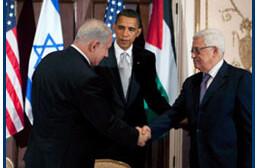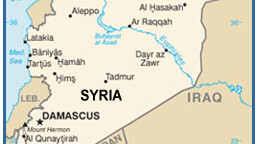President Obama's management of the health care reform bill provides a valuable lesson for his management of the Israeli-Palestinian conflict. The president tried to build consensus and some semblance of bipartisanship for over a year with no success, and only after all other avenues had been exhausted did he personally intervene. In the end, a reasonable compromise was signed into law. Until recently, the president seemed to be taking a similar stance in the Israeli-Palestinian conflict. He delegated the task of restarting negotiations to trusted aides, and he tried not to become involved in the minutia of the conflict. Now, in the post-health care afterglow, The Washington Post and New York Times both report that Obama may propose his own peace plan this fall. If he does indeed propose his own plan, it would be a dramatic shift in U.S. policy and in direct opposition to Times columnist Thomas Friedman's "Fifteenth Mideast Rule"; "Whether it is Arab-Israeli peace or democracy in Iraq, you can't want it more than they do" (see "Mideast Rules to Live By," Friedman, December 20, 2006). Friedman is probably right, but the issue in this case is not a lack of desire for peace, it is the political inability to achieve it. To that end, not only must Obama propose a plan, but if the plan is calibrated correctly, he should attempt to impose it on the two parties despite the fears of many in Israel and against the advice of the estimable Mr. Friedman. Obama has no choice but to try to achieve peace in the Holy Land, as ignoring it, as President George W. Bush eventually learned, is ultimately politically untenable. The United States may not be on the ground in Israel or the Palestinian territories, but despite being caught off guard by previous peace initiatives, in the eyes of the world we are already intimately involved in the process. Fortunately for Mr. Obama, Middle East peace should be far simpler than American health care reform. The basic contours of a final agreement have existed from before the 2000 Camp David talks through the 2001 Taba Summit. In all probability a final agreement will consist of land swaps for major settlement blocs, compensation but no return for refugees and their descendants, a demilitarized Palestine, and some sort of redistricting or sharing arrangement for Jerusalem. These ideas were the building blocks of the aforementioned meetings and the Palestinian negotiators know that Israel will not accept a "right of return" and the Israeli negotiators know that the Palestinian leadership will only accept a Palestine free of Israeli settlers. Jerusalem is the most complicated of the remaining issues and there are a number of interesting proposals on the topic (see "Two States, One Capital," Cristol, April 8, 2009). The current ideas are no different than those previously proposed, so what must change are the incentives to agree to the proposal already on the table. The president must accept that while Israelis and Palestinians both desire peace, for the time being both sides lack political incentives to come to a final agreement. Israel's main goal for an end to the conflict is to achieve peace and maintain Israel's Jewish democratic character. But Israel already has peace. The wall has put an end to the suicide bombings that started after the Oslo process and peaked during the second intifada. The Palestinians who once worked in Israel have long since been replaced with Thai, Filipino, and Chinese workers. Israelis are living without fear of Palestinian attacks—with the major exception of fear from Gaza- and Lebanon-launched rockets. Additionally, Israel already maintains contacts with the majority of states that do not officially recognize Israel. Israel's major incentive to negotiate is to assure a Jewish majority; but that is abstract and distant, and Israeli Prime Minister Benjamin Netanyahu's governing coalition includes parties such as Shas and the National Religious Party, both of whom agree to the idea of "land for peace" in principle, but fear that they will give up the land and no peace will come (as in the Gaza and Lebanon cases). Like Israel, the Palestinian Authority lacks incentives to end the conflict. Despite a dramatically improved economy and Palestinian Prime Minister Salaam Fayyad's admirable weeding out of corruption, there are still too many Palestinians living outside of the West Bank and Gaza who believe that they will return to their homes in Israel proper. The Palestinians also know that demography and time are on their side. Even though today the majority of Palestinians (and Israelis) support a two-state solution, they may feel very differently if Palestinians become the majority under Israeli rule. Last, one need only look at the relationship between Fatah and Hamas to know that the internal political divisions among Palestinians are even more pronounced than in Israel. How then can peace be achieved? Time is not on Israel's side and the low threshold (one of the lowest in the world) to seats in the Knesset make the Israeli political system difficult to manage for any prime minister. President Obama must force a resolution to the conflict. He should not nitpick Israel over settlements that everyone knows will remain part of Israel in any final peace agreement (for more detail see: "The Settlements Are Not An Obstacle To Negotiations, But Netanyahu Should Freeze All Construction," Cristol, June 29, 2009). He should make a bold, forceful, and powerful move unlike any before seen from an American president. Obama must provide incentives for both sides to finally sign on to an agreement produced by years of negotiations and bloodshed. For Israel, the United States must do a better job of providing what Ariel Ilan Roth calls "strategic reassurance." Roth discusses this concept in his recent article in International Studies Quarterly, "Reassurance: A Strategic Basis of U.S. Support for Israel." Roth argues that it is in the United States' interest to provide Israel with "strategic reassurance" that the U.S. will come to its aid if necessary. The fact that Israel possesses a much stronger and sophisticated military than its enemies is irrelevant. Roth argues that Israel perceives itself as highly vulnerable. Thus, without assurance from the U.S. it is far more likely to act unilaterally in a way that might destabilize the region and disrupt the free flow of oil to the U.S., still our most vital concern in the Middle East. Obama has so far failed to provide this reassurance. Iran is perceived by Israel to be an existential threat. It doesn't matter if it is or if it is not. An independent Palestine is seen as a strategic threat. It doesn't matter if it is or is not. Many recent reports detail Netanyahu's concern about Iran, but Obama seems to have put more priority on halting the expansion of settlements in the West Bank and Jewish housing in East Jerusalem, and thus being seen as an "honest broker," than on reassuring Israel that he will either not let Iran go nuclear (something probably impossible) or will extend America's nuclear umbrella to Israel if it does. There is no formal treaty with Israel that guarantees that the United States will come to its defense if attacked. A treaty may not be necessary, but strong language from the president, vice president, and secretary of state that an Iranian attack on Israel would be treated as an attack on the United States, and that the United States would defend and support Israel in the United Nations if it strongly retaliated against rocket (or other) attacks from either an unrecognized "Hamastan" in Gaza or from an independent Palestine on the West Bank, would go a long way to easing the way for Israel to sign an agreement. Providing incentives to the Palestinians to finalize an agreement is a much simpler task (if more difficult politically in the United States). President Obama can put his (our) wallet where our (his) mouth is and buy the Palestinian state. A peace agreement between Israel and the Palestinians would be underwritten by the United States and the international community just as the Camp David Accords bound the United States to provide military and other aid to Israel and Egypt in perpetuity. The U.S. would provide a massive amount of economic and educational assistance to the Palestinian Authority (PA) in the West Bank-building infrastructure, reforming schools, and developing the Qualified Industrial Zones that have worked quite well in Jordan and reasonably well in Egypt. The U.S. should promise to shepherd the new state of Palestine into the global financial institutions and even fund the construction of a secure underground tunnel between Gaza and the West Bank—to be opened when the PA has assumed control over Gaza. In the meantime Gaza would receive nothing so long as it is controlled by Hamas; and Israel, the United States, and the Palestinian Authority should work together to undermine the Hamas government. The goal of this plan should be peace and the end of the conflict; democracy, or the domestic character of the Palestinian government should not be at issue. For this plan to work, President Obama would need to put an expiration date on the deal. The Palestinians have all the time in the world. Israel does not. The president must make the Palestinians an offer that no reasonable leader would refuse and force a settlement on both sides. We can only hope that if he were to invest his political capital in this task that the Palestinians would fail to live up to their reputation of "never failing to miss an opportunity to miss an opportunity."

CREDIT: Official White House photo by Samantha Appleton
Incentivizing Peace in the Middle East: A New Role for the United States
Apr 13, 2010

